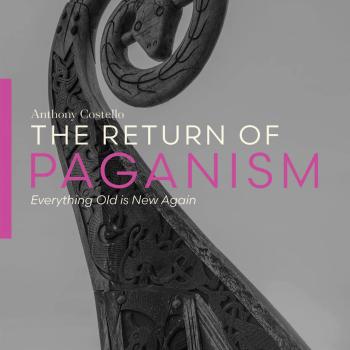In 2020, pop-star Cardi B. rocked the music world with her ultra-vulgar song “WAP.” While I will not reproduce the song’s lyrics here, it may be necessary to click on the above link and examine, albeit briefly, its lyrics. In doing so, one hopefully experiences some shock at, what can only be called, an ode to sexual barbarism. That said, such vulgarity should not be too surprising to anyone who has immersed themselves in the biblical story. Nor should it shock those who have listened carefully to what the Church has said over the centuries about the depravity of man and the corrosive nature of sin on the mind. Fortunately, we still live in a culture imbued with enough generic Christian sensibility to spark some outrage about this song, even if far less outrage than in previous generations.
However, it is not just Christians or Orthodox Jews who might find this massively popular hymn to sexual exploitation unsurprising. Those who are familiar with the phenomenon that Immanuel Kant once described as “das radikale Böse” (radical evil), will see in both the song and the meteoric rise of its creator, an embrace of what another German philosopher has called the theologia diaboli or “theology of the devil” (see F. H. Heinemann, Existentialism and the Modern Predicament, 205-214).
The truth is, Cardi B. is not without her historic predecessors, both in the realm of pop music (e.g., 2 Live Crew) as well as existentialist philosophy. Whether known to the provocative songstress or not, Cardi stands in a long line of sophisticated thinkers and creative geniuses who have found comfort in the arms of evil, especially as it manifests itself sexually.
The Theoligia Diaboli of Jean Genet and Jean-Paul Sartre
In his survey of 20th century existentialism, philosopher F.H. Heinemann appends a short essay commenting on Jean-Paul Sartre’s book, Saint Genet, Comedien et Martyr. Sartre’s book explores, in no uncertain terms, the nature of radical evil. Heinemann, writing in the 1950’s from Oxford, opens his review of Sartre’s tome by considering the current state of Western culture:
Human societies are to-day [sic] secularized to a degree unheard of in former times. Some of them are indifferent and others hostile to religion, some ‘humanistic’, others openly atheistic. There are millions of people to whom nothing is sacred. But why is it that nations soaked in humanism, which have achieved a high standard of material well-being, are nevertheless unhappy? Can a society which has completely lost the sense of the holy reach a state of relative perfection? Further, is it possible to eliminate the sense of the sacred altogether?
So begins Heinemann’s commentary on Sartre, whose existentialism demanded that God not only die but never again be resurrected. Saint Genet is itself an exposé on the thought and moral psychology of the French writer, activist and thief, Jean Genet.
Jean Genet started life as a petty thief and vagabond, eventually doing time in a Parisian jail. After his release from prison he visited the US as a guest speaker and supporter of groups like the Black Panthers and activists like Angela Davis, a pupil of German philosopher Herbert Marcuse. Genet also protested against police brutality in Algeria with his fellow French novelists, Sartre and Foucault. The main themes of Genet’s works were a celebration of homosexual sex, moral iconoclasm and finding beauty in acts of evil and criminality.
Regarding Sartre’s ode to the iconoclast Genet, Heinemann says, “Saint Genet pursues this rebellion [of evil-doing] to its extreme possibilities” (Heinemann, 206). In other words, Sartre’s hommage to Genet pushes the boundaries of morality to the edges of human sensibility. For Sartre, Genet is a modern saint. He [Genet] radically overturns all things that could be construed as Judeo-Christian morality or as part of “civilized” culture. In doing so, Sartre honors Genet for Genet’s celebration and embrace of the criminal. Heinemann calls this reveling in rebellion a Justificatio Diaboli, or a “Diabolo-dicy” (as opposed to “Theodicy”).
For men like Genet and Sartre there truly is nothing sacred. There are only two fundamental facts for such thinkers: material realities and the free will of man. Moreover, anything that has been traditionally viewed as heathen, barbaric or malevolent, is now not only open to pursuit and practice but to praise. Thus, Genet and Sartre can applaud everything from coitus per anum (Genet was a notorious homosexual who wrote in detail about the act of sodomy), to lying, to pursuits of personal vengeance. These are all considered acts of liberation, liberation from traditional religion as well as man’s alienation from his true nature as a pleasure seeking beast.
For the French existentialists, no longer are there pleasures forevermore to be sought at the right hand of the Almighty God (Psalm 16:11). Instead, whatever is at God’s left hand is where the pleasures lie. All the abominations of the Bible are now the objects of desire for these modern existentialists. This pursuit of evil, especially in the realm of sensuality, but certainly not limited to sexuality, takes on concrete form as a theological anti-dogma.
The Principles of Theologia Diaboli
One can articulate the core principles of the devil’s theology with relative clarity. Heinemann lays them out in detail, details worth reproducing in full:
1) Regard every event, even if, and especially when, it is harmful…as if it were the product of your unconditioned will and a gratuitous gift which you have decided to make to yourself. 2) Your principal motive should be the horror that your future action may inspire in others and in yourself. 3) Act in such a manner that society treats you always as an object and as a means, and never as an end in itself or as a person. 4) Act as if the maxim of your action could be regarded as a rule in the thieve’s tavern….
Heinemann, Existentialism, 208
These formulations of the evil will act as perversions of the Kantian ethic, expressing the following sentiments:
1) The megalomania of a man who would like to possess the creative power of a negative God, i.e. of the Devil; 2) the sadistic cruelty of a character anxious to dominate others and to equal the dictators; 3) the masochistic self-abasement of a ‘have-not’ who throws his most valuable possession overboard-his personal integrity-and who allows himself to become a mere object and merely a means to an end; and 4) the cynical contempt of the realm of persons or of the Kantian realm of ends, and the corresponding exaltation of the thieve’s tavern!
It is points 3 especially that relate to how Cardi B.’s song, and her own attitude toward her song, follows in the tradition of men like Genet and Sartre. Indeed the young rapper’s message is not new. If anything is novel, it is the proffering of the anti-dogma by a woman and not just by wicked and depraved men. But, this too is not really new.
WAP and Instrumentalizing the Human Person
Point 3 of the act and sense of the theologia diaboli claims that for any act to be liberating, one must intentionally allow oneself to be treated as a mere tool or instrument by society. The idea that a human person is intrinsically valuable, or possesses an ontological worth that cannot be handled instrumentally, is itself repulsive to the upside-down ethic of radical evil. The song WAP is as clear an expression of this intent as anything could be.
The woman in the song, here Cardi herself, is no longer a being of intrinsic value. Instead, she is merely a body meant to serve a function– the function of being sexually pleasurable to the dominant male. It is this embrace of “self-abasement” that should shock us, were we spiritually healthy people. The open question is whether or not our culture was indeed shocked at all?
There are a few important implications of this kind of libertinism. Moral dissolution always surfaces the most profound questions of human existence. Conservatives have noted one of these implications for years. This is the apparent inconsistency of women being empowered through the marketing of their bodies to horny, vile, and, usually, very rich men. This new means to feminist empowerment undoes everything the original suffragists fought for. It even rubs against some of what feminists of the 1970’s and 80’s were arguing against and fighting for, both in the law courts and the court of public opinion.
Cardi B. And the Will to Power
In Cardi B’s vision, the road to power is no longer through competing with men in the academic, industrial, economic, legal, military or medical arenas. Instead, old-fashioned temple prostitutions is the means to power. Of course, if avarice also counts as a moral good on the theologia diaboli (which it does), then it makes sense that whatever the road to fame or fortune may be, it is one worth traveling.
However, WAP further propagates the spiritual disease of seeing women as reducible to sex objects. If this anti-dogma is “right,” then it becomes difficult, for example, to understand what someone like a Harvey Weinstein actually did wrong. After all, he was emotionally primed by the entertainment industry itself to view women as mere instruments of sexual pleasure. And, he took advantage of his own power. This is all commendable according to the theologia diaboli. Cardi’s vision provides an explicit model for young girls to see themselves as sexual slaves in the service of men, and to see that slavery as itself a good thing (again, point 3 on Heinemann’s list).
To Cardi’s defense, one could say it will only be those men who can afford these young sex slaves that will actually have them. Something like monetary exchange or a “life of ease” does seem part of the Cardi telos. This exchange of the human body for wealth, i.e., of the human person for luxury, does seem to fulfill point 4 of the theologia diaboli anti-dogma. This is the principle that makes unholy and unjust commercial exchanges a desirable endeavor.
Cardi’s performance of the song also satisfies point 2 on the list. It invokes horror in those who still retain some semblance of a Christian moral ethic or generic moral conscience (or who just have young children). In an interview with Stephen Colbert, she seemed to indicate that part of her intent was just that, to “piss off a whole bunch of Republicans.” In another interview it is “fake religious people” who have been strangely unsettled. Unfortunately, or fortunately for her, I think there were more than just Republicans or religious people who were horrified at such an abuse of talent.
Finally, when one listens to Cardi’s testimony about her music and her life, we see the most profound condition of the theologia diaboli fulfilled. This is the self-revelry in the expression of one’s “unconditioned will.” Here, we might say that Cardi is as close to a real life embodiment of Nietzsche’s Übermensch as one might find today. In the unconstrained expression of her will, she not only achieves heroic greatness in record album sales, but achieves life fulfillment:
“Life is about making your dreams come true, but in order to make your dreams come true, don’t think that it’s gonna come and fall from the sky to your lap…You actually gotta put in the work. You gotta be ambitious. You gotta network. You gotta become great at what you do. You gotta be able to take criticism — believe it or not, y’all be saying I don’t take criticism, but yes I do.”
from an interview with “People” magazine, https://people.com/music/cardi-b-wap-pissed-off-republicans/
A creative genius unbound and released from any moral norms lay at the heart of Nietzsche’s “overman.” Perhaps we could say that Cardi is today’s “overwoman.”

The True Nature of Sex and The False Liberty of the Existentialist Mind
In his book on classical wisdom and modern psychology, The Road Less Traveled, M. Scott Peck describes authentic love in psychoanalytic terms as “The will to extend one’s self for the purpose of nurturing one’s own or another’s spiritual growth” (Scott Peck, The Road Less Traveled, 81). This is a definition that coheres well with the traditional Christian view of agape. This extending of one’s self for the sake of the other’s growth usually requires other virtues. Most importantly it takes the virtues of discipline and sacrifice.
Love, in this sense, is not a mere feeling or set of temporary sensations. Rather, according to Peck, “Love is an act of the will.” When the pleasurable nature of sexual intercourse is taken into account, however, it becomes tempting for people to conflate the physical stimulus of coitus with love itself. This is highly problematic to the human person:
It is obvious and generally understood that sexual activity and love, while they may occur simultaneously, often are disassociated, because they are basically separate phenomena. In itself, making love is not an act of love. Nonetheless the experience of sexual intercourse, and particularly of orgasm (even in masturbation), is an experience also associated with a greater or lesser degree of collapse of ego boundaries and attendant ecstasy. It is because of this collapse of ego boundaries that we may shout at the moment of climax “I love you” or “Oh, God” to a prostitute for whom moments later, after the ego boundaries have snapped back into place, we may feel no shred of affection, liking or investment.
Peck, Road, 96
The goal of this essay is not to ridicule or judge the person known as Cardi B. However, it is to point out that the singer/songwriter has fallen into the ancient trap of looking for authentic love, i.e., the dropping of ego boundaries, in the sexual act itself. Clearly this mother of a young daughter should want to feel real love, the kind of love that safeguards the value of the human person, that invests in that person, and that acts on behalf of that person’s spiritual well-being.
Unfortunately, WAP is profoundly clear about the kind of “love” it is aiming for: the sheer physical pleasure that attends the fleeting and uncommitted sexual act. The lack of willingness by both partners to commit to the person inside the sexualized body does not lead to liberation as one might hope. As soon as ego boundaries “snap back into place,” the realization of one’s enslavement and emptiness often follows. The Bible explains this abuse and misuse of sex and power in its opening chapters. Here, the inspired author knows what sin will do to God’s original design for human companionship,
To the woman he said, “I will greatly increase your pangs in childbearing; in pain you shall bring forth children,yet your desire shall be for your husband, and he shall rule over you.”
Genesis, 3:16
Existentialism and False Liberation
From a biblical standpoint, the “Overwoman” is not really empowered over anything. In fact, she has merely submitted to the sinful rule of man. Philosophically speaking, Heinemann echoes Peck’s understanding of real love and freedom by pointing out the abject failure of Sartre’s diabolical theology:
In short, Sartre’s freedom is no real liberty, but caprice and licence, and therefore insufficient as a basis for ethics. Real freedom consists in accepting responsibility for one’s own actions in relation to others within a moral order, and equally for this order itself. A choice is not authentic because it is made by the Self and of the Self, but because it is the right choice, i.e., it is the choice of the right moral order and the right action in these particular circumstances, made on the basis of this moral standard.
Heinemann, 212.
Caprice and license to do whatever one’s inner impulses suggest is not freedom. It is slavery. Authenticity lies not in a choice for “the Self” by “the Self” but in making the right choice, a choice aimed at an objective standard. St. Augustine saw this most clearly in his formulation of the doctrine of original sin. To entertain without restraint our inner most desires is not to become like God, it is to usher in our own destruction and become as nothing. Our Creator has made us to be a certain way. To struggle against the way we were meant to be, while not always futile, is ultimately fatal. It is fatal because in resisting the grace and subsequent redemption it offers, we will never experience authentic Love.
We will never know the Love that saves, that sustains, and that grows us. We should pray that Cardi B. will not go down the road of Jean Genet or Jean-Paul Sartre. Instead we hope she will turn away from the glorification of the self, which only serves Satan’s desire for total domination of our souls. Once she does, as I suspect she might, then her true glorification in Christ may begin. This story is not uncommon, even if it is wondrous.














